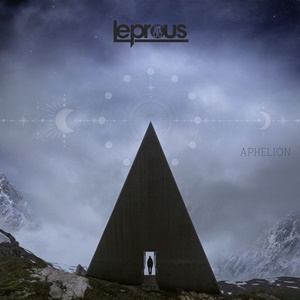Stellar musicians know how to challenge themselves the deeper they develop their career. Leprous may have begun as a progressive metal/rock act, but over the last few records they’ve added more atmospheric, post-rock, and outside pop influences to expand the sonic outlook of what they can do and achieve. Aphelion as the seventh studio record for the quintet allows the listener to embrace the wide array of textures, musical interplay, and versatility vocally that make these Norwegians a mainstay, reliable group that appeases the faithful, gaining newcomers into the fold as well.
The first single “Running Low” features cello work from Ralph Weinroth-Browne amidst a slow building arrangement, the lower register verses spreading out into some intricate drumming passages and exhilarating background harmonies as well as carefully chosen guitar/keyboard lines that possess alternative, post-rock influences. EDM/cyber keyboard swirls against the snappy snare signal the start of “Silhouette” – another hypnotic number containing killer ebbs and flows musically, calmness against driving parts where keyboardist Einar Solberg rises to his highest range to match the propulsive sequences. Blurring the lines of what progressive music can be appears to be the sweet spot for Leprous at this point in their career – there are still those numbers where time signatures fluctuate, guitars shimmer, and the musicians dance effortlessly around in the instrumental sequences for shock and awe purposes (“All The Moments” and “The Silent Revelation” two clear examples) – and yet there’s a natural groove/melody component that penetrates all ten tracks. Continuing the mental health/anxiety journey that started on the previous Pitfalls album, the personal lyrics allow Einar a chance to showcase his rhythmic, emotional resonance, exploring everything from ballad-like charm to dramatic, moving progressive rock on personal favorite “The Shadow Side”. Using three different studios to work out the material due to the pandemic, the listener should treasure the diverse output, down to the twisting seven-minute plus closer “Nighttime Disguise” which includes light jazz movements and the occasional metallic scream against some bombast sequences, keeping everyone who listens on the aural uprise.
Never content to deliver the same album twice, Aphelion allows Leprous to explore those outside reaches of their creative desires safely with satisfaction – admirable and key to sustaining contentment at this point in the lifespan of an established artist’s discography.


